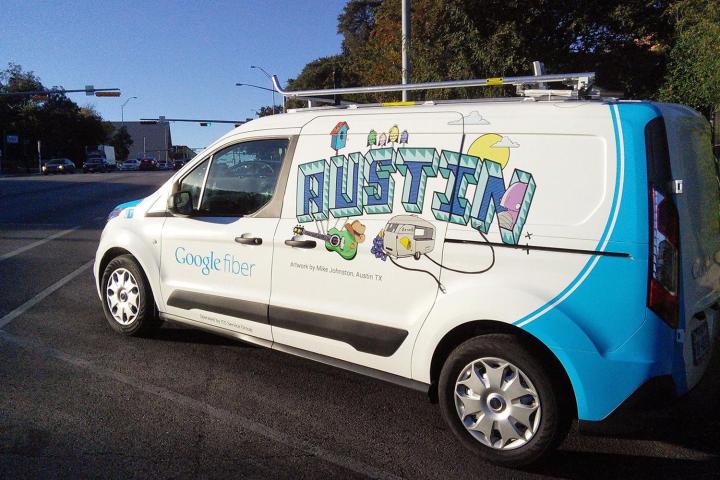
Fiber, for the uninitiated, is a Google-owned internet service that delivers upload and download speeds of up to one gigabit per second. An optional package, Fiber TV, supplements the offering with local and premium cable channels. Costs range from $70 a month to $130, depending on the bundle.
Raleigh joins a growing list of metropolitan areas with Google’s high-speed Fiber service. It’s available in San Diego, San Francisco, Oakland, Orange County, San Jose, and Los Angeles, California; Austin, Dallas, and San Antonio, Texas; Miami, Jacksonville, and Tampa, Florida; Provo and Salt Lake City, Utah; Oklahoma City, Oklahoma; Phoenix, Arizona; Portland, Oregon; Charlotte, North Carolina; Boston, Massachusetts; Huntsville, Alabama; Kansas City, Kansas; Louisville, Kentucky; Nashville, Tennessee; Atlanta, Georgia; and The Triangle, Virginia.
Rumors suggest Google will use Webpass, a small-time internet service provider (ISP) that operates a network of point-to-point wireless technologies, to expand its infrastructural footprint to dense urban centers where deploying fiber is cost prohibitive. At a recent shareholder’s meeting of Google’s parent company, Alphabet, Inc., Chairman Eric Schmidt unveiled plans to test in-house technology that would beam gigabit-speed internet into people’s homes. The impetus, he said, is twofold: resistance from incumbent cable companies, and the high costs associated with laying down fiber.
In Nashville, Fiber rivals Comcast and AT&T threatened to pursue legal action if the city’s Metro Council voted to allow Google to bring its own infrastructure into the town. AT&T sued to try to stop a similar law in Louisville, Kentucky. In the U.S., the cost of laying down fiber can be as high as $80,000 per mile.
Google’s Fiber immediate plans are in flux, though. Craig Barrett, former chief executive of Access, the Google subsidiary that oversees management of Fiber, stepped down from his roll to serve as an adviser. Google subsequently “paused” Fiber’s rollout and laid off employees in “certain areas of […] supporting operations.”
Google hasn’t let Fiber languish, though. It recently updated the Fiber TV mobile app with the ability to play and record TV shows, movies, and sports with a single tap. And FCC filings in August revealed tests of “experimental transmitters” on the gigahertz frequency capable of delivering high-speed internet over the air.
Editors' Recommendations
- Google Fiber is bringing high-speed internet to five new states
- A zero-day Google Chrome security flaw requires you to update now
- Google parent firm pops Loon balloon internet project
- NYC’s Mount Sinai Hospital using Google Nest to monitor coronavirus patients
- Google Maps expands voice guidance for blind and partially sighted users


